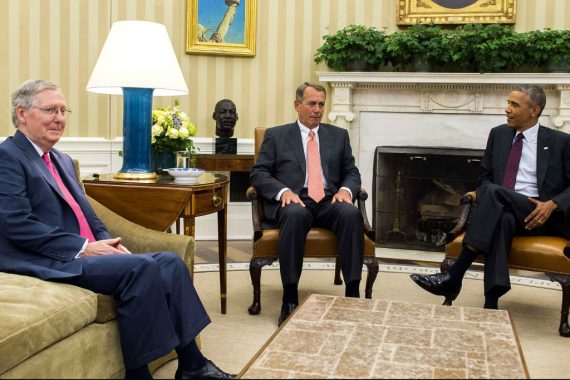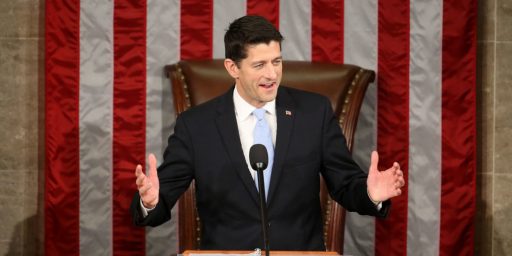Don’t Expect Anything Out Of Washington In Obama’s Final Two Years
Despite the conciliatory language after Tuesday, it's unlikely that much will change in Washington in the next two years.
Listening to the comments from President Obama, Speaker John Boehner, and presumptive Senate Majority Leader Mitch McConnell one could easily find oneself confused as to what the path forward in Washington, D.C. is likely to be now that Republicans have regained control of both Houses of Congress for the first time since losing it in the 2006 midterm elections. In their post-election press conferences, held in the days immediately after Tuesday’s big election successes for the GOP, all three men struck conciliatory ones and talked about working together to get things done, for example. Senator McConnell, for example, struck a conciliatory tone and talked about restoring what he has long called “regular order” to the Senate by requiring most bills to go through the committee process and allowing members to offer Amendments on the floor, something that the GOP has long complained that outgoing Majority Leader Harry Reid has failed to do. McConnell also sent what many saw as a clear message to the Ted Cruz wing of the Senate GOP Caucus by vowing there would be no government shutdowns, and no default on the national debt. At his press conference later that same day, President Obama said he was similarly eager to find common ground to work with Congress going forward, a task that will be much harder for him than it has been since the start of his Presidency, but also sent hints about possible confrontations in the future over immigration and other issues. For his part, Speaker Boehner’s post-election tone was more combative, in no small part because he was the last of the three to speak in the wake of the election results and was, at least in part, reacting to the President’s comments that he would take unilateral action on issues like immigration unless the House took the action he demanded, but at the same time the Speaker also put forward the face of someone who wanted to appear to be open to working across party lines to pursue progress on issues that have been moribund for years now, including tax reform and international trade issues that have largely been ignored by both sides for various reasons. The three men, along with other members of the House and Senate leadership, closed out the week with a long working lunch at the White House from which there were very few leaks, but what we did hear was largely a repetition of the same conciliatory tone we’d heard since Tuesday night.
Most of this, of course, is the same sort of feel-good rhetoric you hear after every election not matter what the result. It’s become something that the voters, the press, and the pundits expect, especially in an era of divided government such as this, and, as always, it’s largely all just rhetoric and that, for both parties, the incentives are likely to push everyone toward a continuation of the confrontation that has epitomized the first five years of the Obama Presidency and will likely be a large characteristic of the next two. For one thing, the political realities that dictated how Republicans in the House and Senate proceeded forward in the years after the 2010 elections have not really change after last Tuesday. It’s true that the Tea Party movement and hard core conservatives in the GOP had a rough year backing candidates to either challenge sitting members of the House or Senate or win the nominations for open seats, especially in the Senate, however as I’ve said before that only tells half the story. To a large degree, the Tea Party has already won the ideological battle inside the GOP and is going to have a lot to say about how the party proceeds now that it has a lot more power in Washington. One sign of this can be seen in a post-election editorial from National Review, which cannot fairly be considered part of the Tea Party movement per se, in which the magazine pushes back against the suggestion from McConnell, Boehner, and others that the GOP needs to show the American public that it can “govern” and get things done. Instead, the editors argue that the party should use this new found power to lay out an agenda for 2016, a course of actions which essentially means eschewing deal making and compromise in favor of setting things up for the next election, strategy that makes it less likely that we’d see progress on controversial issues like immigration reform.
There’s nothing new in the suggestion that Republicans ought to use the next two years to set the stage for 2016, of course. The final two years of any President’s eight years in office are seldom one in which major progress is made on controversial issues as a general rule. We did see major immigration and tax reform in the final two ears of President Reagan’s term, of course, but both of those measures had been in the works well before being signed into law late in 1986 after the GOP had lost control of the Senate and the Iran/Contra scandal had broken in the weeks afterwards. From that point forward, Washington found itself consumed by hearings on that scandal and the President, after righting the ship from the crisis that the scandal had caused inside the White House, turned his attention to foreign affairs and working out historic arms control and other agreements with the Soviet Union that helped end the Cold War and, albeit unintentionally, hasten the demise of the nation he had once called an evil empire. The final two years of President Clinton’s time in office were remarkably similar, with a scandal that led to only the second attempt to impeach and convict a President in American history and the President turning his attention outward, that time to the always tempting effort to bring Middle East peace.
In all likelihood, things will likely unfold the same way in President Obama’s final two years. Emboldened by their election victories, Republicans are likely to step the oversight hearings that we’ve seen since 2011 up a notch, with the Senate how looking in to many of the same alleged scandals that the House of Representatives has been looking into. Both parties will be looking ahead to 2016, and will likely be unwilling to reach broad deals on issues that they believe will benefit them in that election, such as immigration, tax reform, and entitlement reform, The fight against ISIS, the crisis in Ukraine, and the fight against Ebola in western Africa, are likely to distract the nation significantly from domestic politics for the foreseeable future, as well as likely serve as the vehicle by which President Obama will take advantage of his inherently greater powers to act instead of worrying so much on domestic policy. And, most importantly, within a matter of mere months, candidates for President, including those who can be safely said to be “serious” candidates rather than merely vanity candidates like Ben Carson and Bernie Sanders, will start announcing their candidacy for the White House, All of this essentially guarantees that the status quo in Washington will be political posturing, playing to the base, and preparing for 2016. In the end, neither party really has an incentive to do much of anything else at this point.
On a final note, one thing would seem to guarantee that little will be done in Washington should President Obama go forward with it, and that’s immigration. In a tone that was strangely combative given the electoral drubbing that his party had just taken, President Obama threatened Congress with unilateral action on immigration reform if it fails to act by the end of the year, This, of course, is the same unspecified threat of unilateral action that the President made over the summer, only to postpone it just prior to the start of the post Labor Day campaign season, much to the chagrin of many immigration activists and pundits on the left. We still don’t know exactly what it is the President is contemplating, but from various hints it would appear to entail some kind of expansion of the temporary relief granted by the Deferred Action For Childhood Arrivals program he announced in 2012. While this action may well be well within the discretion granted to the President by applicable law, it seems obvious that such unililateral action will indeed “poison the well” as Speaker Boehner has put it and make it far less likely that he and other Republicans in leadership will be able to convince back bench members and the grassroots to go along with compromise on other issues Moreover, establishing a deadline for action in this area of the end of this year is completely unrealistic given that the new Congress will not take office until January and there isn’t any realistic possibility of the House Leadership putting immigration reform bills passed by a Senate that won’t exist after December 31st before a House composed of many lame duck members. If that’s the measuring stick the President intends to use on this issue, then he’s going to get the inaction he appears to want, the excuse he wants to act, and the result will be a new 114th Congress that he will be starting off with on completely the wrong foot.
Perhaps the pessimism will be proven wrong, but the idea that we’ll see anything other than more of the same from Washington between now and the 2016 General Election is rather Pollyannaish in any case.







The Republican leadership is going to have a hard time getting their members to support any budget that contains funding for ObamaCare, and Obama isn’t going to sign something that doesn’t, so I wouldn’t believe any suggestions that there won’t be a shutdown.
My fear is that this will lead to a Grand Bargain, based on Simpson-Bowles (fun fact: the Simpson-Bowles commission never released a report, Simpson and Bowles released their report separately because the commission wouldn’t support it), or some other variant of Catfood Commission. Obama does love to compromise.
Hopefully, the Republicans will overplay their hand, and we will get nothing out of Washington. But, if they were willing to settle for 15oz of flesh rather than a full pound, Obama would go along with it.
“Obama does love to compromise.” Sarcasm noted.
“But, if [Republicans] were willing to settle for 15oz of flesh rather than a full pound, Obama would go along with it.” Sarcasm noted again.
The message voters sent is irrelevant to our President.
Keystone will pass.
It’s the one thing that has bipartisan support.
Obama might veto it but I think if the GOP led congress passes bills and forces Obama to veto them then that sets them up better for 2016 than letting everything stall. I think they need to focus on the economy etc and avoid getting caught up in the culture wars/social issues stuff. IMO that’s the kind of stuff they need to leave to the states.
I certainly expect Senator McConnell to get the same cooperation from the Administration and Democrats that he and the (two shutdowns) party provided the Administration over the past 5 years.
I’m very optimistic.
@RockThisTown:
Well, the message voters sent to the Republican Party in 2008 and 2012 was irrelevant to Republican Party leadership, why the complaint now?
These election turnovers run in cycles. While the results of November 4 were not that surprising, there was a message there. The president and new congress members need to do is come up with a “contract for the middle class”. This needs to consist of:
tax reform: go to a flat tax, with deductions only for health expenses, mortgages, and education expenses. Give the middle class working people a break. More money to spend would mean more jobs.
Energy: give grants for energy research, and not just to huge corporations or universities. There are plenty of backyard and basement inventors who have good ideas too. There needs to be an energy “pentagon” size research center where the world’s top scientists, engineers, designers, and inventors can get together. See link below about a phenomenal new development.
Rebuild the infrastructure: we need to bring the aging interstate highway system into the 21st. Century. This means things like imbedded lighting, heating systems that will melt snow and ice, and fog blowers. Also communications systems that link to gps devices and cell phones. Get ready for the smart cars! Rebuild, modernize, and update the aging electrical grid. This country is vulnerable to a complete electrical breakdown of apocalypse proportions.
Government reform: too many agencies, programs, and departments. There are some agencies that members of congress and the president probably do not even know exist. Get rid of a lot of the burdensome regulations that increase costs for businesses. And let’s cut out a lot of this foreign aid that usually winds up in some rich dictator’s pockets.
Look at this: a breakthrough in nuclear energy ! The Lockheed Corporation has developed a nuclear fusion reactor that will fit on the back of a truck ! This is what we have been waiting for: energy from water ! See it at: http://www.lockheedmartin.com/us/products/compact-fusion.html
The President and Congress need to listen to the average people. Then they need to put their heads together and come up with some common sense programs. This is not complicated. It just takes some will power and a get it done attitude.
@Tyrell:
The “average people” elected a Congress that shut down government twice in 5 years, and according to an article posted here this morning, is kind of Ignorant. These days I’m not sure “average people” have common sense solutions.
@Just Me:
Republicans have been focused on the economy for years. Unfortunately, they have been damaging it, not helping it grow.
@al-Ameda
Be specific – to whom in the Republican leadership was the ’08 & ’12 message irrelevant? And I’m not just complaining now; I’ve been complaining since 2006.
@RockThisTown:
Mitch McConnell, just to name a somewhat important Republican leader.
Let’s keep it real. The voters, matter only if they’re associated with the party of your (my) preference. Of course Republicans NOW want Democrats to listen to the voters now that they (Republicans) have won majorities in the House and Senate. The Kabuki was somewhat different when Republicans did not want to listen to the voters when Obama won in 2008 or 2012.
By the way, on Immigration? Which Republican Party should opposition Democrats listen to? The Rubio side – the one that crafted a bi-partisan reform bill, that Boehner and House Republicans rejected out-of-hand? Or the Cruz Republicans which wants no part of the Rubio-Schumer proposal or with negotiating with Democrats?
Obama already made his idea of compromise clear on immigration reform — “you can give me what I want, or I’ll just do what I want.” And possible responses have already been raised. The one I see as having merit is to simply forbid any expenditures for amnesty. Obama wants to issue green cards to illegals? Let’s see him make and distribute them without spending one red dime.
And I seem to recall after the 2006 elections, we were all told that the president had to come to grips with the new reality in Congress and learn how to work with them, as the election was a stunning rejection of his policies by the American people. This election is different, and that isn’t the message this time. I just can’t, for the life of me, see why it’s different…
Also, when Congress starts passing bill after bill and sending them to the White House, where Obama will veto them, it’s Congress that is being “obstructionist.” Just like how the GOP-controlled House sent bill after bill to Harry Reid’s Senate, where he left them to die of neglect, it was the Republicans who were being “obstructionist.”
I thought that to “obstruct” was to keep things from happening. When did the definition change on me?
@Jenos Idanian #13:
It didn’t, Mitch McConnell defined it clearly following Obama’s election in 2008.
@al-Ameda: So the “obstructionist’ part was when the Democrats held both Houses, and were so impaired that they rammed through ObamaCare with only a single GOP vote? Didn’t that end when the GOP took back the House?
Given what we’ve got the last 30 years… we can always hope.
@Jenos Idanian #13:
To clarify: The GOP obstructionist part is in progress – from 2009 to 2016.
Democrats? They are hapless bystanders.
@anjin-san:
Harry Pearson has passed away.
@Guarneri:
There is a good Pearson thread over on Steve Hoffman forums.
A giant figure in high end audio…
To be honest, as long as there’s not an extended government shutdown, and especially no debt ceiling default, I really wouldn’t mind a whole lot of “nothing”.
p.s. Jenos, I still can’t figure out why so many people think there will be a lot of bills passed, that result in a lot of vetoes? The Senate will still be just as much of a bottleneck. The majority of bills that make it out (because they were able to attract the 5 or 6 Democrats needed for cloture) of the Senate (especially those not passed via reconciliation … you know, that “unconstitutional” procedure that was used to “ram through” Obamacare) will be signed by the President. Most vetoes will come on “just for show” bills (such as defunding Obamacare) that are passed with all Republican votes via reconciliation.
p.p.s. Mitch McConnell will not get rid of the filibuster just to make President Obama veto more bills. But if by some chance they get a Republican President in 2016, and he’s still majority leader, I think that smart money would bet it will be gone pretty quickly then.
BTW, if they knew then what the backlash was going to be over the half-asses compromise that the ACA always was, do you think that Democrats might have considered the “nuclear option” back in 2010 to pass (with just a majority) at least a public option, if not true single payer healthcare?
Especially if the filibuster rules are further weakened in near term, I think historians may look back on that as a missed opportunity … in 20 or 30 years when we finally get single payer, I’m pretty sure a lot of people will be asking “why didn’t we do this sooner?”.
@al-Ameda: To clarify: The GOP obstructionist part is in progress – from 2009 to 2016.
Democrats? They are hapless bystanders.
“Hapless bystanders?” Dude, you need to lay off the acid.
Here’s how history unfolded in the real world:
2006: “Hapless” Democrats take control of House and Senate.
2008: “Hapless” Democrats hold House and Senate, gain White House.
2010: “Hapless” Democrats lose House, keep Senate, still have White House.
2012: “Hapless” Democrats hold Senate and White House.
2014: “Hapless” Democrats lose Senate, still have White House.
Or, from the other side:
2006: Republicans lose House and Senate, still have White House.
2008: Republicans lose everything.
2010: Republicans regain House.
2012: Republicans keep House.
2014: Republicans regain Senate.
You’re arguing that the Democrats are so “hapless” that they can’t get anything done unless they have an absolute monopoly on power, and the Republicans are so powerful that they can dominate things when they hold only one-half of one-third of the federal government?
Why the hell would you want to shout so loudly just how impotent your side is? Are you hoping to win on pity?
And at one point do you plan on flip-flopping and talking about how essential for democracy the Senate filibuster is? I mean, that’s gotta be on the calendar soon, right?
@RockThisTown:
You’re kidding right, please tell me you are some kind of alzheimer patient. The narrative of the Republicans in 2008 and 20012 was “we must protect out voters from the evil tyranny of the majority, who will do nothing but throat cramming. The cramming of our throats will be unceasing as our throats will overflow with cramming.
@Jenos Idanian #13:
My hope is that Democrats cooperate with McConnell and the rest of Republican leadership in equal proportion to the cooperation that McConnell and his fellow Republicans cooperated with Democrats. That seems reasonable to me.
I don’t think that we can expect Democrats to engineer a couple of federal government shutdowns, or attempt to leverage their demands against a default – do you? That’s Republican business.
@al-Ameda: My hope is that Democrats cooperate with McConnell and the rest of Republican leadership in equal proportion to the cooperation that McConnell and his fellow Republicans cooperated with Democrats. That seems reasonable to me.
And should they do, the Republicans have the Reid Option with regard to the filibusters. Could be entertaining…
@Jenos Idanian #13:
by the way:
Do you think Democrats might try that one time?
Finally, you know what’s very interesting? Democrats hardly used the “Reid Option” at all. They used it to move normal executive appointments along and Republicans hardly noticed.
@al-Ameda: Do you think Democrats might try that one time?
Well, the sequester was Obama’s idea in the first place…
But it’s all hypothetical at this point. The Democrats still have their Lame Duck session to play out. But I think I’ll be poking through the archives here and see what sort of arguments were used to say that the filibuster is terrible and awful and undemocratic and the WORST THING EVAR, because I have a little hunch they might become entertaining…
@Jenos Idanian #13:
Are you saying that the sequester caused Republicans to shut down government two times, and also attempt to leverage the debt limit and a possible default on federal bonds as a means to get Obama to repeal ACA?
@al-Ameda: It takes two to tango. There’s only an impasse when neither side is willing to give.
Oh, that’s right. You were a big fan of Obama Sequester Theater, when the Obama administration ordered agencies to make the sequester cuts as public and painful as possible, even if it meant spending more money to shut down something than to just leave it alone. I am referring, of course, to things that didn’t cost anything to leave open, like the World War II Memorial and scenic overlooks along the highways.
@Tyrell: Dude, go check the article on this provided by Aviation Leak (as we call it in the industry). And read the comments.
Same old, same old. This technology has been known, and it isn’t the best-since-sliced-bread that LM is touting it is. They’re spinning it off into a separate company, did you notice? If it was really that great, why wouldn’t they be holding on to it?